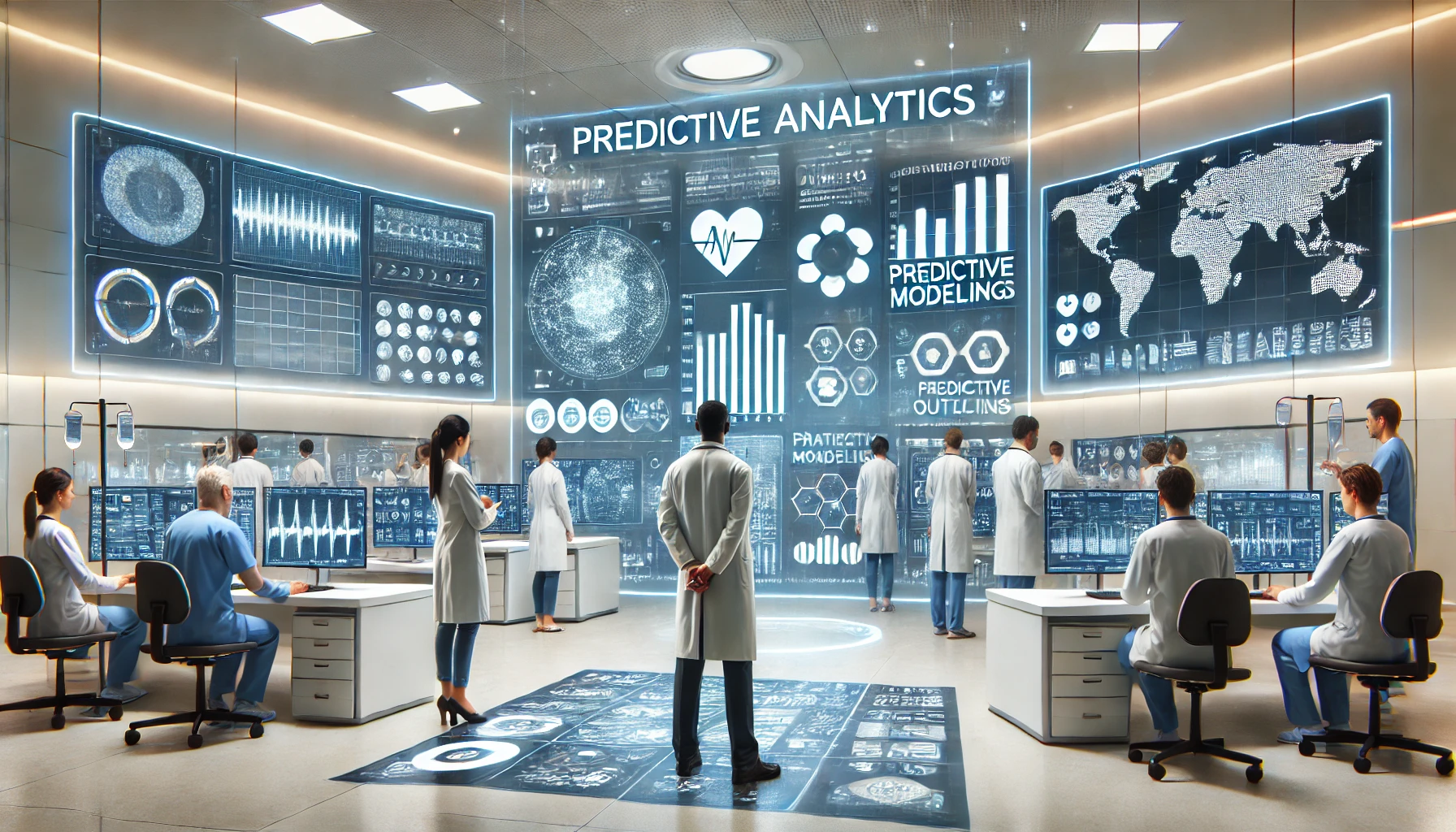Predictive analytics is revolutionizing healthcare by leveraging historical and real-time data to improve patient outcomes, reduce costs, and optimize operations. This technology allows healthcare providers to identify at-risk patients, manage chronic diseases more effectively, and anticipate equipment maintenance needs before disruptions occur. For instance, predictive models can help determine which patients are most likely to require hospitalization due to chronic conditions like cardiovascular disease, enabling proactive interventions
What Is Predictive Analytics in Healthcare?
Predictive analytics in healthcare is a data-driven approach that uses historical and real-time patient data to predict future outcomes. By combining techniques like machine learning, statistical algorithms, and data mining, healthcare professionals can forecast potential health events, allowing for proactive decision-making and personalized treatment. This method is transforming the healthcare industry by enabling early identification of at-risk patients, improving chronic disease management, and optimizing hospital operations.
Key Benefits of Predictive Analytics in Healthcare:
- Identifies at-risk patients: Helps detect patients who may develop chronic diseases or require hospitalization, enabling timely interventions.
- Reduces healthcare costs: Predicts resource needs, preventing unnecessary hospitalizations and reducing patient and hospital expenses.
- Optimizes hospital resources: Forecasts staff and equipment requirements, improving operational efficiency.
- Enhances personalized care: Analyzes individual patient data to deliver tailored treatment plans.
- Prevents equipment failure: Predicts maintenance needs, reducing costly downtimes.
- Reduces readmission rates: Provides data insights to create better post-discharge care, lowering the risk of patient readmission.
Incorporating predictive analytics in healthcare not only improves patient outcomes but also ensures a more efficient and cost-effective healthcare system.
Predictive Analytics: The Future of Personalized Healthcare
Discover how data-driven insights help healthcare professionals anticipate medical issues, reduce costs, and improve outcomes.
The Power of Predictive Analytics in Healthcare
Predictive analytics is revolutionizing healthcare by leveraging historical and real-time data to improve patient outcomes, reduce costs, and optimize operations. This technology allows healthcare providers to identify at-risk patients, manage chronic diseases more effectively, and anticipate equipment maintenance needs before disruptions occur. For instance, predictive models can help determine which patients are most likely to require hospitalization due to chronic conditions like cardiovascular disease, enabling proactive interventions.
Chronic Disease Management and Early Interventions
One of the key applications of predictive analytics in healthcare is chronic disease management. With five chronic diseases—cancer, cardiovascular disease, diabetes, obesity, and kidney disease—accounting for 75% of healthcare spending, predictive models provide an opportunity to significantly lower costs. By analyzing patient data, healthcare organizations can predict the progression of these diseases and provide early interventions, thus improving patient outcomes and reducing the need for expensive treatments.
Reducing Costs and Enhancing Operational Efficiency
Another significant advantage of predictive analytics in healthcare is its ability to reduce costs. Predictive models can optimize resource utilization, such as hospital bed occupancy and staffing needs, ensuring that hospitals are adequately prepared for patient inflow. Furthermore, predictive maintenance for medical equipment minimizes downtime and avoids costly repairs.
Combating Fraud and Enhancing Data Security
Predictive analytics also helps in fraud detection and prevention. By analyzing anomalies in patient data and billing records, predictive models can identify suspicious patterns that might indicate fraudulent activities, thus safeguarding healthcare resources.
81% of employees believe that AI enhances their performance
Transform your business with Sphere’s AI expertise—from research to real-world applications. Explore our services to lead in innovation and drive efficiency.
Transformative Benefits in Healthcare
From reducing human errors to forecasting staffing needs and cutting patient costs, predictive analytics brings wide-ranging benefits to the healthcare sector. Its integration into hospital management and clinical workflows allows for better decision-making, enabling more personalized and effective treatments.
For more insights into how predictive analytics is reshaping industries beyond healthcare, Sphere Inc. provides comprehensive solutions in AI and data intelligence. You can explore relevant case studies such as AI in insurance underwriting or the broader applications of AI in business through their AI and data services. These resources offer a detailed look at how AI-driven solutions can enhance operational efficiency across sectors.
Optimizing Hospital Resource Allocation with Predictive Models
Predictive analytics is vital in optimizing hospital resource allocation, ensuring that healthcare facilities operate efficiently. For example, predictive models can forecast patient inflows and staffing needs, allowing hospitals to prepare for busy periods and avoid understaffing. These models analyze historical patient data, weather patterns, local events, and disease outbreaks to estimate future demand. By using this data, healthcare providers can adjust staffing schedules and ensure that resources such as hospital beds and medical supplies are utilized effectively.
Moreover, predictive maintenance of medical equipment, such as MRI machines, helps avoid costly downtimes and extends the life of critical hospital machinery. By monitoring the health of these machines in real time, hospitals can anticipate when parts need replacement and schedule maintenance during off-peak hours, minimizing disruptions to patient care.
Improving Patient Care with Personalized Treatment Plans
Predictive analytics in healthcare has transformed how medical professionals deliver patient care by making it more personalized. By analyzing data from electronic health records (EHRs), demographic details, and even patient lifestyle data, predictive models help healthcare providers develop individualized treatment plans. These data-driven insights can predict a patient’s response to certain treatments, making it possible to fine-tune care for better outcomes.
For instance, a diabetic patient can have their treatment adjusted based on continuous glucose monitoring data, significantly improving management of their condition. This proactive approach allows healthcare professionals to intervene before complications arise, ultimately reducing the need for emergency care.
Innovate. Accelerate.
Learn how hospitals leverage predictive analytics to prevent equipment failures, reduce readmission rates, and streamline operations.
Reducing Readmission Rates and Improving Patient Outcomes
Reducing hospital readmission rates is another critical area where predictive analytics shines. By identifying patients who are at high risk of readmission after discharge, hospitals can implement targeted interventions, such as follow-up care or more personalized discharge plans, to lower the chances of rehospitalization. This not only improves patient outcomes but also reduces the strain on hospital resources.
AI in Action: Case Studies on Healthcare Efficiency
Sphere Inc. offers AI-driven solutions to enhance healthcare operations, with specific examples such as optimizing patient care using predictive models. For example, a case study on AI integration explores how healthcare providers can modernize their data infrastructure and integrate AI solutions to achieve greater operational efficiency. This approach allows organizations to not only improve patient outcomes but also reduce operational costs.
For businesses seeking AI solutions across industries, Sphere Inc. also provides specialized AI and data professional services, offering tailored consulting and implementation services to meet the unique challenges of healthcare and other sectors. These services ensure that organizations can fully leverage predictive analytics to drive innovation and efficiency in their operations.
This powerful combination of AI and predictive analytics is setting the stage for a more efficient, cost-effective, and patient-centric healthcare system.





